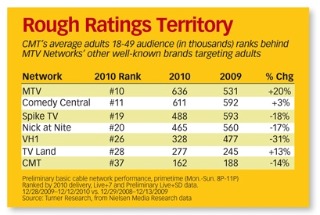CMT WhistlesNew Comedy Tune

The smarter way to stay on top of broadcasting and cable industry. Sign up below
You are now subscribed
Your newsletter sign-up was successful
CMT this week will unveil its biggest original programming bet since joining the MTV Networks fold in 2000, with the premiere of the network’s first sitcom.
Executives at the network hope the launch of Working Class on Friday, Jan. 28, at 9 p.m. will help CMT follow in the footsteps of FX, AMC and most recently sister net TV Land by elevating its brand with breakout scripted series. “There’s such a long history of original scripted programming taking a basic cable channel and giving it an identity and bringing a whole new audience to it,” says Brad Johnson, CMT senior VP of comedy development.
CMT is making a significant financial investment in the strategy, with a marketing push that network President Brian Philips calls the biggest they’ve put behind a series to date. The plan includes local cable buys in 31 markets, national cable, print ads, spot radio, signage in malls and grocery stores and integration into Facebook gaming platform Social City. It adds up to “a launch spend that is very much in keeping with the way the biggest cable networks launch new shows,” Philips says.
The network, primarily known for country music programming, reaches 91 million homes but remains far from ranking among the largest cable networks Philips speaks of. It is among the lowest-rated MTV Networks channels. CMT became part of that group after Viacom assumed control of the network when it merged with CBS. In 2010, CMT ranked 37th among basic cable networks in primetime in adults 18-49 ratings, and the network lost 14% of its audience in that demo from 2009.
While CMT execs would welcome success on the level of what Hot in Cleveland did for TV Land last summer, they are wary to put Cleveland-sized expectations on Working Class. “Hopefully it builds on our audience, doesn’t alienate our core, and brings new people to it,” Johnson says. “If it works on the level of Hot in Cleveland, God bless, that’d be lovely.”
Regardless of audience reaction to Working Class, both reality and scripted comedy will continue to be part of the lineup at CMT. The network is shooting half a dozen pilots over the next few months and will be adding more firepower in West Coast-based development, including a replacement for Bob Kusbit, who left his post as CMT’s head of development in December. Johnson hopes that CMT can find its niche with familyfriendly domestic comedies and even build a block of them in its schedule.
Financially, CMT is in a bit of a rut. Last year, SNL Kagan estimates the network generated $212 million in revenue, up slightly from 2009, though cash flow slipped a bit to $82 million. “It’s pretty tiny compared to the other fully distributed networks, so there’s a lot of potential there,” says Derek Baine, analyst at SNL Kagan.
Baine says Viacom, like Discovery Communications, is making moves to increase the value of networks that have full or significant distribution but currently generate little in revenue. In the face of retransmission fees multichannel operators are handing over, MVPDs are “going to start really analyzing the ratings performance of networks versus their license fees,” Baine says. “The old days of being able to leverage everything as a bundle is going to weaken a bit. So if you’ve got a fully distributed network, you really want to get the rating up to a competitive level so you don’t lose that distribution.”
The Traditional Family Formula
A sitcom was a logical next step for the network, according to CMT executives, as comedy programming had traditionally played well to its audience through shows like the reality series World’s Strictest Parents.
“CMT audiences have never boxed the channel into the narrow music-video channel,” says Philips. “They’ve told us, and ratings reflect, that they’re comfortable with a broad spectrum of entertainment on the channel as long as it speaks to their values, their point of view and is something they can watch with their families.”
Working Class channels that audience, centering on Carli Mitchell (Reba’s Melissa Peterman), a single mom who moves her kids to an upscale suburb to try and give them a better life and is forced to take a job at a grocery store deli with her curmudgeonly neighbor, played by Ed Asner.
Philips calls the series perfect for CMT not because there is anything particularly Southern about it, but because of its sensibility. “Country music lyrics are about situations,” Philips says. “Sometimes you’ve got to laugh and sometimes you cry, but no matter what, you deal with it.”
Not only did the network feel they had the right show with Working Class, but saw an absence of other series like it on television. Where shows like Roseanne and Everybody Loves Raymond once dominated family-friendly comedies, edgier series like Modern Family and Raising Hope now populate the domestic sitcom genre. “The sitcom has taken, in general, a slightly snarkier, more cynical tone,” Philips says.
“There’s been an historic appetite for multi-camera domestic comedies,” adds Johnson. “America didn’t stop wanting those, but the networks stopped producing them. Our challenge was just take a form that works and give it 2011 issues and problems and characters.”
“And I hope the networks continue to ignore them, I really do,” Johnson says. “Keep doing your edgy, cynical shows, please, please, please. I think that’s just a recipe for very narrow, cult audiences, and I think we have a chance to have big hits with these shows.”
Jon Lafayette contributed to this report.
The smarter way to stay on top of broadcasting and cable industry. Sign up below
